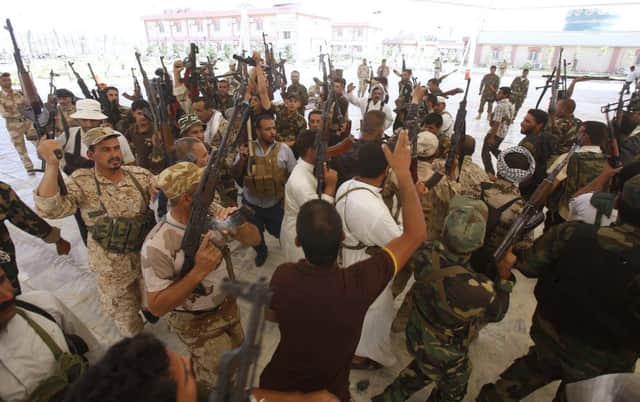US special forces land in Iraq to face Isis


Iraqi Prime Minister Nuri al-Maliki – fighting for his job and under international pressure to create a more inclusive government – last night said he supported starting the process of forming a new cabinet within a week.
But he gave no promise of greater representation in government for the minority Sunni Arab community, and said forming an emergency administration that included all religious and ethnic groups would go against the results of April’s parliamentary elections.
Advertisement
Hide AdAdvertisement
Hide AdIn northern Iraq, the Sunni militants extended a two-week advance that has been led by the hardline Islamic State in Iraq and the Levant (Isis) but also includes an amalgam of other Sunni groups angered by Mr Maliki’s rule. They blame him for marginalising their sect during eight years in power.
The fighting threatens to rupture the country two and a half years after the end of US occupation.
Secretary of State John Kerry pressed Iraqi officials to form an “inclusive” government during a visit this week and urged leaders of the autonomous Kurdish region to stand with Baghdad against the onslaught.
A parliamentary session is planned within a week that will start the process of forming a new government based on the results of elections held in April.
Mr Maliki’s Shiite-led State of Law coalition won the most seats but needs support of other Shiite groups, Sunnis and Kurds to build a government.
The United Nations says more than 1,000 people, mainly civilians, have been killed during the Sunni insurgents’ advance in Iraq. The figure includes unarmed government troops machine gunned by insurgents, as well as reported incidents of prisoners killed in their cells by retreating government forces.
In addition to the bloodshed, close to a million people have been displaced in Iraq this year.
Amin Awad, director of the Middle East and North Africa bureau for the UN refugee agency, yesterday described Iraq as “a land of displacement”.
Advertisement
Hide AdAdvertisement
Hide AdPresident Barack Obama has ruled out sending US ground troops back to Iraq, from which they withdrew in 2011.
He has offered up to 300 American military advisers and special forces, about 130 of whom have now been deployed.
Another 50 US military personnel are expected to arrive within the next few days and US military personnel are also flying manned and unmanned reconnaissance flights over Iraq.
Iraqi state television reported that newly arrived Pentagon advisers met Baghdad’s operations commander and agreed to set up a joint operation command.
Baghdad is racing against time as the insurgents consolidate their grip on Sunni provinces.
Yesterday, militants overran the Ajeel oil site, 19 miles east of Tikrit, which contains at least three small oilfields that produce 28,000 barrels per day.
Ajeel is connected to two pipelines, one running to Turkey’s Ceyhan port and the other to the Baiji oil refinery, which has seen fierce fighting and effectively remains the front line between Isis and Iraqi government troops.
State TV showed troop reinforcements flying into the compound by helicopter to fend off the assault on Baiji, a strategic industrial complex 130 miles north of Baghdad.
Advertisement
Hide AdAdvertisement
Hide AdLocal tribal leaders said they were negotiating with both the government and Sunni fighters to allow the tribes to run the plant if Iraqi forces withdraw.
Militants including Isis and allied Sunni tribes battled Iraqi forces in the town of Yathrib, 55 miles north of Baghdad, into the early hours of yesterday.
Four militants were killed, witnesses said.
Insurgents have surrounded a massive air base nearby, which was known as Camp Anaconda under US occupation, and hit it with mortars.
In recent days, Baghdad’s grip on the Western frontier with Syria and Jordan has also been challenged. One post on the Syrian border has fallen to Sunni militants and another has been taken over by Kurds.
A third crossing with Syria and the only crossing with Jordan are contested, with anti- government fighters and Baghdad both claiming control.
For Isis, capturing the frontier is a step towards the goal of erasing the modern border altogether and building a caliphate across swathes of Iraq and Syria.
The group gained another boost in that direction when members of Syria’s al-Qaeda wing, the Nusra Front, pledged allegiance to it in the border town of Albu Kamal, strengthening its control of the frontier.
Isis supporters posted images online of what they said were Nusra fighters taking an oath of loyalty to ISIS in the town.